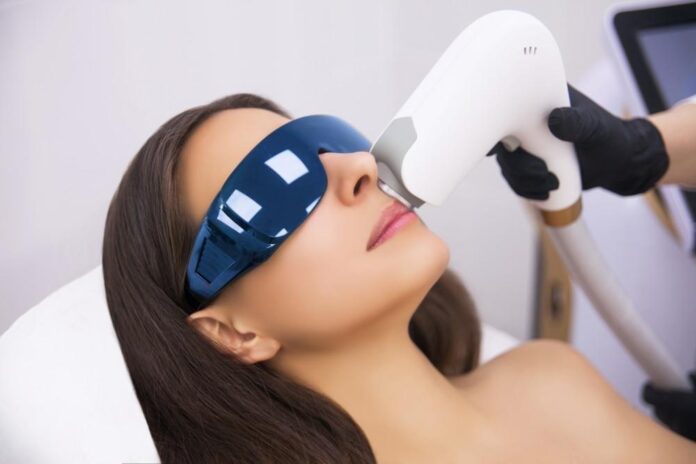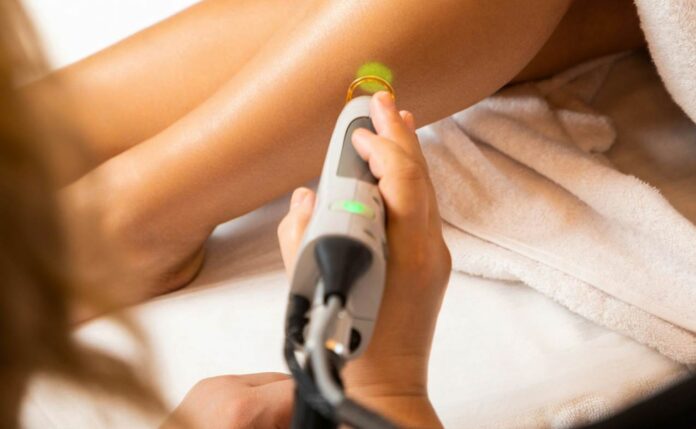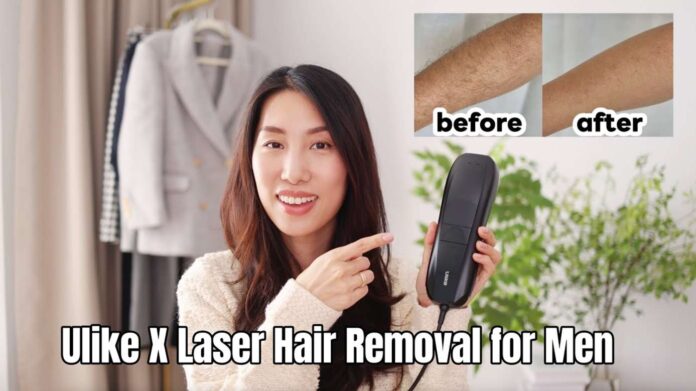Laser hair removal is one of the dream treatments for excessive hair on the face and body. Its treatment helps in permanent reduction in hair regrowth and it is exactly the reason why women save for years to get their hair removal done.
Furthermore, one of the causes of excessive hair regrowth is hormonal changes in pregnancy. So, are you also going through pregnancy-associated hirsutism and want to eliminate the condition with the help of laser hair removal?
However, are you afraid that the radiation will harm your fetus? If yes, let us find out if can you do laser hair removal and what other options are available.
Table of Contents:
- Part 1: How Does Laser Hair Removal Work?
- Part 2: Does Unwanted Body and Facial Hair Growth Increase in Pregnancy?
- Part 3: Can You Do Laser Hair Removal While Pregnant?
- Part 4: Why Should You Not Go for Laser Hair Removal in Pregnancy?
- Part 5: Which Hair Removal Methods Are Suitable for Hair Removal in Pregnancy?
-
Part 6: Which is the Best Option to Get Rid of Excessive Unwanted Hair After Delivery?
1. How Does Laser Hair Removal Work?
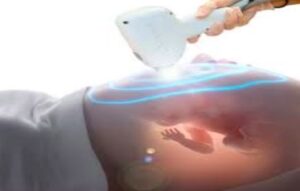 Let us understand what is the principle behind laser eliminating excessive hair growth associated with pregnancy to determine if it is safe or not.
Let us understand what is the principle behind laser eliminating excessive hair growth associated with pregnancy to determine if it is safe or not.
Well, in-salon laser equipment gives out rays in the range of 700 to 1200 nm wavelength. This wavelength of light is absorbed into the dark hair as the pigment can receive the laser radiation efficiently.
Through the hair light travels all the way to the hair follicle. Here, it is converted into heat energy by the mechanism of selective thermophotolysis. This heat destroys the hair follicles and reduces hair regrowth [1].
It is not confirmed if the rays get past the hair follicles and reach the baby. However, based on the “ALARA”, it is better to keep the radiation exposure as low as possible.
2. Does Unwanted Body and Facial Hair Growth Increase in Pregnancy?
 In pregnancy, there are changes in the hormonal status of women because of disruption of the normal menstrual cycles guided by hormones and conception of the fetus there is a release of excess hormones to maintain pregnancy.
In pregnancy, there are changes in the hormonal status of women because of disruption of the normal menstrual cycles guided by hormones and conception of the fetus there is a release of excess hormones to maintain pregnancy.
Estrogen and androgens are specifically increased in pregnancy and these two hormones stimulate excessive hair growth. You can notice hair growing on places where it was previously unnoticeable like the chin.
Additionally, the hair becomes thicker and the hair growth cycle also slows down leading to darker hair. Therefore, unwanted body and facial hair growth increases significantly in pregnancy as determined by an observational study [2].
3. Can You Do Laser Hair Removal While Pregnant?
 This one could seem like a tricky question as there is not much information on how laser hair removal in pregnancy can affect the child.
This one could seem like a tricky question as there is not much information on how laser hair removal in pregnancy can affect the child.
Furthermore, the American Association of Pregnancy does not recommend trying lasers to remove unwanted hair during pregnancy [3]. Therefore, you must wait until your pregnancy is terminated and your health is optimal for laser hair removal.
4. Why Should You Not Go for Laser Hair Removal in Pregnancy?
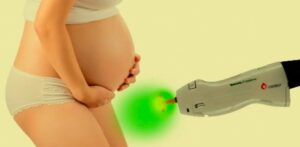 Let us elaborate on the reasons why you should avoid laser hair removal in pregnancy.
Let us elaborate on the reasons why you should avoid laser hair removal in pregnancy.
No Clinical Research That Determines Safety of Laser Hair Removal in Pregnancy
Many women assume that there are no studies that show the adverse effects of laser on the fetus. However, there are no studies that show that laser did not affect the baby either.
Therefore, doctors do not suggest getting laser hair removal while you are pregnant so that there is no accidental or unforeseen damage to the health of the baby.
Intra-Natal Hormonal Imbalance
Some women experience an excess of hair growth during pregnancy while there was not much hair before pregnancy. This change in hair growth results from an increased level of estrogen.
After delivery, the level of estrogen goes to the baseline, and hair growth decreases naturally. So, you do not really need a laser to get rid of excess hair.
Intra-Natal Pigmentary Changes
Just like the level of steroidal hormones changes in the body, the level of melanin is also affected. As the level of melanin increases, pigmentary changes occur in different areas of the body including the face [4].
As laser targets pigment, the absorption of laser rays into the skin can cause laser burns.
The Inconvenience Associated with In-salon Laser Hair Removal
Even if laser hair removal is safe, it is not convenient in pregnancy. Laser hair removal takes 1 to 2 years to complete. This timeline will clash with the terms of your pregnancy and delivery.
Thus, Booking an appointment, waiting for your turn, and then bearing the pain and discomfort caused by laser for 9 months and even more makes it an inconvenient method of hair removal.
5. Which Hair Removal Methods Are Suitable for Hair Removal in Pregnancy?
 As the laser is not suitable for pregnancy, let us explore other methods of unwanted hair removal for our pregnant ladies.
As the laser is not suitable for pregnancy, let us explore other methods of unwanted hair removal for our pregnant ladies.
Also, remember that you can choose not to remove hair at all if it becomes too uncomfortable for you.
Shaving
If you are mainly concerned about the hair growth on large areas like legs, shaving is the best option to try. It is because shaving razors are inexpensive and shaving is a quick method to remove unwanted hair.
However, you will have to be extra careful if you want to shave your pubes. For this, use a mirror to increase visibility. Also, you can ask your partner for help.
Waxing
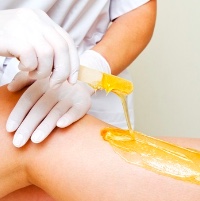 Waxing is a suitable hair removal method for women who would prefer removing hair in one go and being hairless for up to a month. Although painful for women with thick hair during pregnancy, waxing is convenient as you can do it at home.
Waxing is a suitable hair removal method for women who would prefer removing hair in one go and being hairless for up to a month. Although painful for women with thick hair during pregnancy, waxing is convenient as you can do it at home.
Moreover, you can do sugaring if waxing becomes too painful for you.
Depilatory Creams
Waxing or shaving the intimate region is tricky because of the pain and risk of cuts. Therefore, hair removal creams can serve as a user-friendly alternative. Just ensure that the cream you buy ishypoallergenic and compatible with pubic skin.
Depilatory creams work effectively on thick hair in pregnancy and they offer a painless method of hair removal. Also, the results of depilatory creams last longer as compared to that of shaving.
Tweezing and Threading
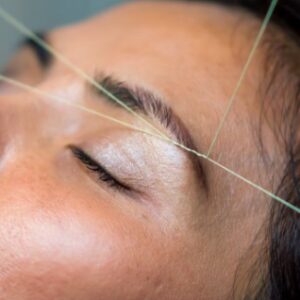
While you can use any method like shaving or waxing on the face, tweezing is suitable for hair that sprouts on the chin and threading proves to be the most precise hair removal option for upper lips and shaping eyebrows.
Also, these methods are economical and you can learn to do them at home by yourself. In any case, ensure that your tweezer and thread are sterilized before you use them.
Bleaching and Electrolysis
While these two methods can be done during pregnancy, it is generally not recommended to bleach your unwanted hair or undergo electrolysis.
This is because the skin can absorb chemicals used in bleaching and it has the potential to harm the child. Similarly, the electrical current used in electrolysis can travel through the amniotic fluid to the fetus.
Thus, stick to temporary hair removal methods until your baby is delivered.
6. Which is the Best Option to Get Rid of Excessive Unwanted Hair After Delivery?
 The best hair removal method after delivery can be Ulike Air 10 IPL Laser Hair Removal Handset. This is because the skin is sensitive even after delivery. So, you would prefer the nearly painless hair removal method.
The best hair removal method after delivery can be Ulike Air 10 IPL Laser Hair Removal Handset. This is because the skin is sensitive even after delivery. So, you would prefer the nearly painless hair removal method.
This method serves as the ideal one if you are looking for semi-permanent hair removal post-pregnancy and enjoy silky smooth skin.
Additionally, leaving baby at home for your in-salon laser hair removal sessions can be inconvenient and Ulike Air 10 offers convenient at-home hair removal treatments.
Also, it is best to wait until the pigmentation of your skin and hormonal level has gone to normal before you start your IPL or laser hair removal treatment [5].

Conclusion
Although there is no research showing that laser hair removal can affect the fetus, it involves the usage of radiation that might prove harmful to the developing fetus.
Moreover, the physical changes associated with pregnancy make laser hair removal an incompatible option to get rid of excess hair. Therefore, you should use a shaving razor, waxing kit, or hair removal creams to remove unwanted hair in pregnancy.
Also, give the Ulike Air 10 IPL hair removal device a try after your delivery if you want long-lasting hair removal.
References
-
-
- Laser-assisted hair removal by selective photothermolysis. Preliminary results. G Lask, M Elman, M Slatkine, A Waldman, Z Rozenberg. Dermatol Surg. 1997 Sep;23(9):737-9. doi: 10.1111/j.1524-4725. PubMed. https://pubmed.ncbi.nlm.nih.gov/9311365/
- Assessing new terminal body and facial hair growth during pregnancy: toward developing a simplified visual scoring system for hirsutism. Yabo Yang, Yang Han, Wenjun Wang, Tao Du, Yu Li. Fertil Steril. 2016 Feb;105(2):494-500. doi: 10.1016/j.fertnstert. PubMed. https://pubmed.ncbi.nlm.nih.gov/26616440/
- Laser Hair Removal and Pregnancy; The Safety of Hair Removal While Pregnant. American Pregnancy Association. https://americanpregnancy.org/healthy-pregnancy/is-it-safe/hair-removal-and-pregnancy/
- Pregnancy and Skin Changes. John Hopkins Medicine. https://www.hopkinsmedicine.org/health/conditions-and-diseases/staying-healthy-during-pregnancy/pregnancy-and-skin-changes
- Is Laser Hair Removal Safe During Pregnancy? Medically reviewed by Cynthia Cobb. Jan 24, 2019. Healthline. https://www.healthline.com/health/laser-hair-removal-pregnancy#how-soon
-

 By ULIKEBEAUTY
By ULIKEBEAUTY





